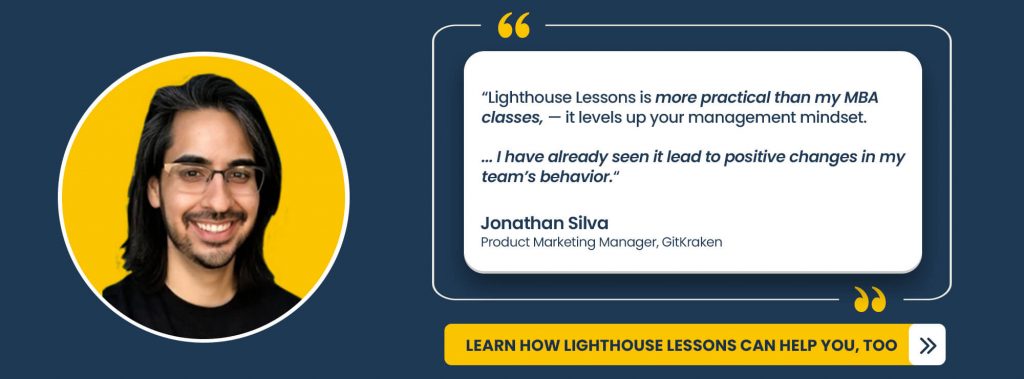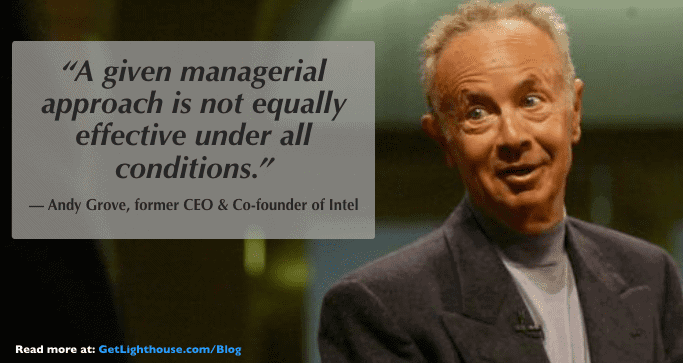Andy Grove, pictured below, is one of the greatest CEOs ever. He co-founded Intel and grew it to over $20 Billion in revenue over a 30 year run as CEO. His approaches to leadership and management are legendary.
He shared many of his ideas in a series of books, including the management guide, High Output Management. I highly recommend the book for any manager, as do others:
@jozeran @Evanish great list and reviews. I definitely recommend adding High Output Management. Great @ev rec my first week at Twitter
— Ryan Sarver (@rsarver) June 15, 2013
I read this book shortly after that recommendation, and my only regret was not reading it sooner. It really is the best book for new managers to start with, and even veteran managers can learn a thing or two from it.
Today, we share some of my favorite lessons from the book by sharing our favorite quotes from High Output Management, so hopefully you'll be convinced to pick up a copy to read for you or a fellow manager and can put more of his great ideas into practice.
Table of Contents: High Output Management Quotes from Andy Grove
- You can be a great manager regardless of your situation.
- Fix problems when they're small.
- Measure what's important and set a standard.
- Time is your scarcest resource as a manager.
- Leading by example trumps everything else.
- Delegate what you know best.
- Regular one-on-ones are a high-value investment.
- When your team member shares something important, write it down!
- Your team often has more perspective than you.
- Only you can save your team member from quitting.
- Ask 1 more question.
- Guide your people with regular coaching.
- Find your highest leverage opportunities.
- Bonus insights and further reading

13 of the Best Andy Grove Quotes from High Output Management
The following Andy Grove quotes are my favorites from the book, which has a lot of depth and ideas well worth learning for any manager.
Use these invaluable pieces of wisdom to become both a better leader and manager, and find out how you can go deeper on these concepts:
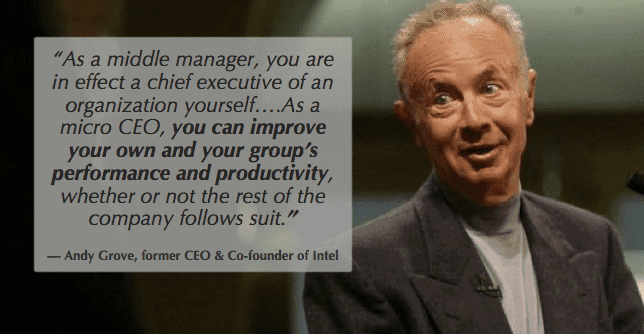
1) You can be a great manager regardless of your situation.
"As a middle manager, you are in effect a chief executive of an organization yourself… As a micro CEO, you can improve your own and your group's performance and productivity, whether or not the rest of the company follows suit."
Be great no matter what's happening in the rest of your company. Don't use the failings of those around you as an excuse; great management will make your team follow you anywhere you go.
Especially in larger organizations, you may not be able to change or fix everything, but you can do a lot to help shield your team and make their lives better.
If you produce solid results (and good management will help you do so), in most cases your company will give you leeway to continue what you're doing, even if it's not standard in the company. Don't wait for permission to be a good manager for your team; take the initiative yourself. Your team will thank you.
Further Reading: Learn how to help your team even in a tough company environment here.
You can also learn how to help your team when things at your company seem to be falling apart and you need to be a good leader during a crisis.
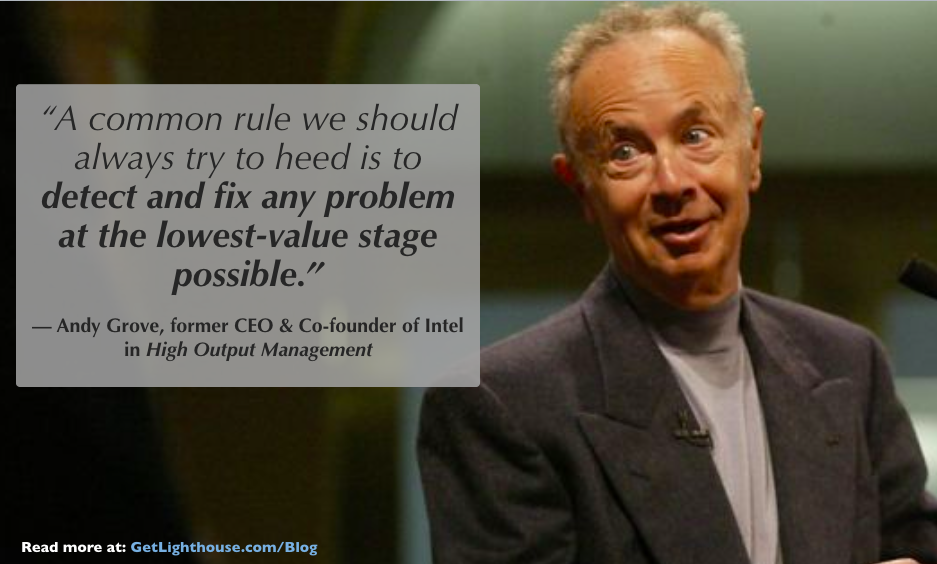
2) Fix Problems when they're small.
"A common rule we should always try to heed is to detect and fix any problem at the lowest-value stage possible."
It bears repeating: Fix problems when they're small! As a manager, you have plenty of tools to detect them if you just listen to your team.
Don't wait until you have a major crisis on your hands. By then, it will take a ton of your time to address and it risks putting you into a reactive management mode that is hard to break out of.
This is where one-on-ones can help (more on this later) as well as surveys and open communication with your team. The key is to be sure you're asking the right questions and following through on what you hear.
If you don't ask, you won't know, and if you don't follow through, your team will stop telling you about things you need to know.
Further Reading: Stuck fire-fighting too often? Learn how to break the vicious cycle of reactive management here. Then, work on your listening skills here to hear (and fix) issues sooner.
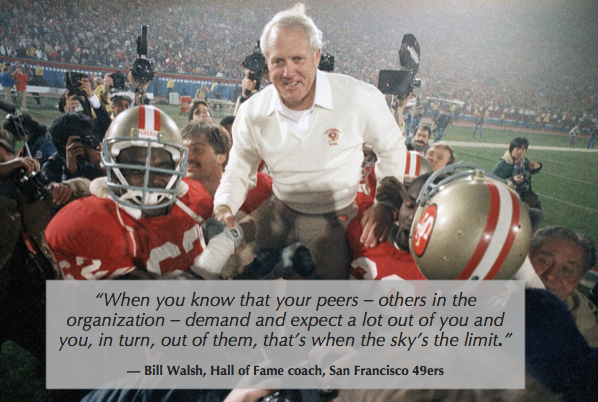
3) Measure what's important and set a standard.
"Measurement against a standard makes you think through WHY the results were what they were."
You manage what you measure. The act of planning and then creating a way to measure the result: a number, a deadline, etc will have many benefits beyond just the assigned task.
Measurement also makes you think in ways you may not always think if you're rushing around all the time. It sets the expectations for your people on what they must do and how their work will be evaluated.
As Dale Carnegie recommends, "Give the other person a fine reputation to live up to", and with the right measure, you might just be surprised by the results you will get.
Further Reading: Accountability and measurement start with managers. Learn how Google measures their managers here, and get your own Manager Score here. And learn how Bill Walsh led the San Francisco 49ers to 3 championships by setting clear, high standards here.
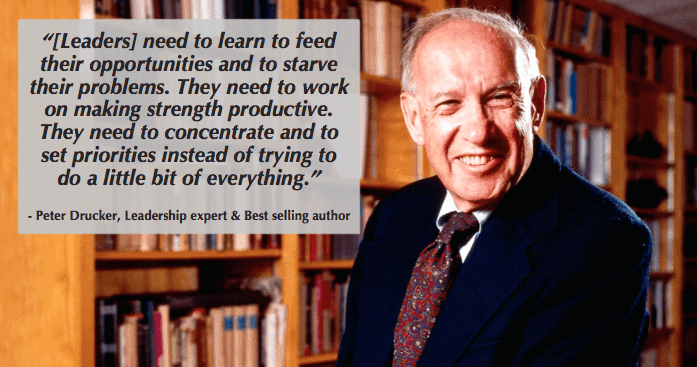
4) Time is your scarcest resource as a manager.
"The single most important resource that we allocate from one day to the next is our own time."
Managers must ruthlessly manage their time. Consider it an investment (Grove, even in writing the book in 1983, valued a manager's time at $100/hr). Avoid being in constant, reactive management and focus on priority management, not time management.
As Grove puts it, "When you say "yes” to one thing, you are inevitably saying "no” to another."
You can find yourself in meetings all day every day if you're not careful, but that's no way to be effective. It also keeps you from many other important activities and long-term thinking.
Budget your time and invest in yourself by blocking off time for big-picture thinking. Don't shortchange the investment in your people either, so also make sure you make time for regular time for one-on-ones.
Further Reading: Need to find more hours in the day? Learn how to better budget your time via priority management here.

5) Leading by example trumps everything else.
"Values and behavioral norms are simply not transmitted easily by talk or memo, but are conveyed very effectively by doing and doing visibly."
Lead by example. What you do is what your team will emulate and believe is expected and valued.
Ask yourself: What is your team emulating from you…both good and bad? Grove believes, "The responsibility for transmitting common values rests squarely with the supervisor."
In Ben Horowitz's book, The Hard Thing About Hard Things, one of the stories he recalls is that his swearing was picked up by the rest of his team. It ended up becoming a big issue and he had to explain to the whole company exactly the kind of swearing that would and would not be acceptable at the company and set his own example to follow it.
You don't have to give a big speech like Horowitz did about swearing to see the impact of leading by example. Even simple things are noted by your team like how you run a meeting, what you praise, and your habits around when you respond to messages versus when you have them off.
Leading by example is especially true and important when considering promoting from within promotions. When you promote someone, it signals to the rest of the organization what is valued most (promotions are a huge reward with many benefits after all).
Someone who lives a value and is promoted will set an example for others, while someone who is not a good example, but was promoted anyway, says that behavior is not just tolerated, but rewarded.
Further Reading: Do you promote from within at your company? Here are 10 common pitfalls to avoid when promoting from within and more on developing leaders when your team gets too big, so you set the right example.

6) Delegate what you know best.
"Because it is easier to monitor something with which you are familiar, if you have a choice you should delegate those activities you know best.”
This Andy Grove quote on management may seem counter-intuitive. It was to me when I first read it, but Grove's case makes a lot of sense.
If you're great at a particular task, it's easier to tell if someone else has a strength to take it on, too. Also, once they're doing the task, you'll need less oversight to tell if things are going well or not. This helps everyone win, as you're less likely to make a hiring mistake, and won't be as likely to need to micro-manage.
Now, don't confuse delegation with abdication; you still need to monitor work to maintain quality and to make your team feel connected and appreciated. The best way to do that is to look at rough drafts and intermediate steps, so you catch problems while they can still be privately fixed as well as give specific feedback that will shape the outcome you desire.
When you know your strengths, and those of your team, you can actively match work and delegate your own tasks in ways that get your team doing what they're best at, setting up your team to perform at a high level.
Further Reading: Learn more about how Andy Grove decides how hands-on to be with someone via his concept Task Relevant Maturity here, and learn more about finding and using strengths to benefit you and your team here.
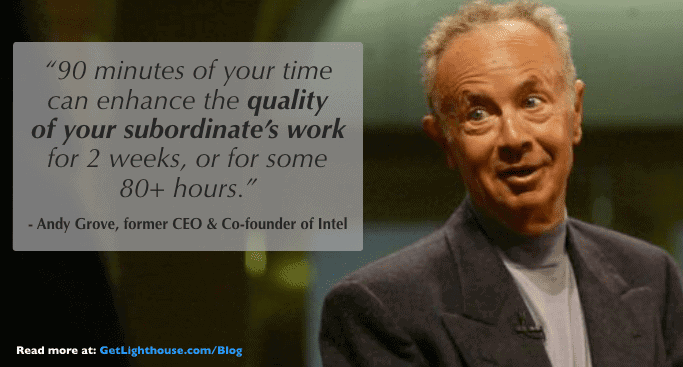
7) Regular one-on-ones are a high-value investment.
"Ninety minutes of your time can enhance the quality of your subordinate's work for two weeks, or for some eighty-plus hours."
One-on-ones matter. A lot. Ben Horowitz was willing to fire over someone not having one-on-ones. If you're not having them, get started now and if you're canceling one-on-ones a lot now, get committed.
This is a meeting that's an investment in your team. They're humans, not robots. Your time and attention is valuable to them and will pay major dividends to both of you.
You will have different situations to always handle and fix, and as we discussed in #2, you want to catch problems when they're small. That's where one-on-ones come in because they're lower pressure than coming to your office or interrupting you, no matter how open your open-door policy is.
Remember, one-on-ones are about them. As Grove writes, "the most important criterion governing matters to be talked about is that they be issues that preoccupy and nag the subordinate."
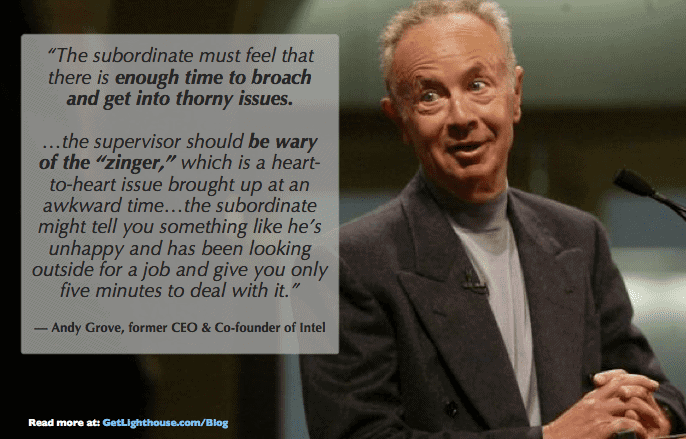
Having these discussions every week or two ensures no problem goes too long without being addressed.
You can also check out this episode of the Creating High Performing Teams podcast that focuses on the best advice on 1 on 1s we heard from our awesome guests in Season 1.
Further Reading: You can also check out our other helpful resources on getting more out of your most essential tool as a manager:
- Effective 1 on 1 Meeting Template with strategies you can apply today.
- Why 1:1 Meetings are So Valuable + How to Max Their Value which includes a free, downloadable sheet with the most important 1:1 Do's and Don'ts you can share with your team.
- 150+ One on One Meeting Questions Great Managers Ask, so you always know what to talk about with your team.
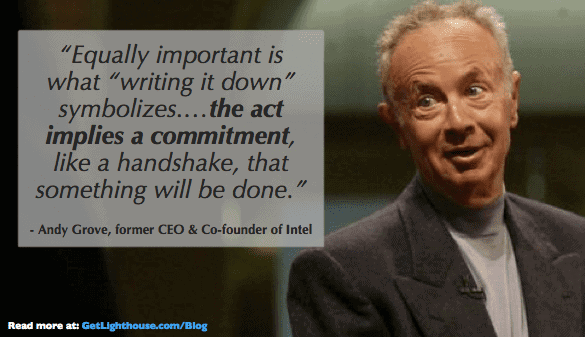
8) When your team member shares something important, write it down!
"Equally important is what "writing it down” symbolizes...the act implies a commitment, like a handshake, that something will be done. The supervisor, also having taken notes, can then follow up at the next one-on-one.”
Don't take notes in your one-on-ones? You should. They WANT you to.
If a team member takes the time to bring it up, it matters to them. They want you to take action, not just talk about it. So take your notes and set some action items by the end of your one-on-ones and other critical meetings.
With how busy the average manager is, it's a mistake to assume you'll remember something later.
Even if you can remember, you're stressing your brain to juggle that and the many other items competing for your attention each day. It shouldn't be surprising that things are easily forgotten when that is the case. Sadly, when you forget, your team members can become discouraged, because they think that means you don't care or it's not that important.
Further Reading: Want some tips on how to take notes in a variety of environments? Here are our best tips for always taking good notes, and if you need more convincing, here's why you should always take notes as a manager.
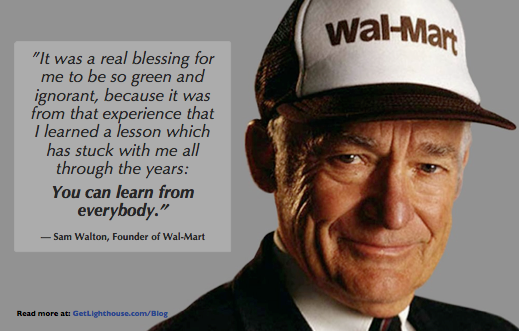
9) Your team often has more perspective than you.
"We managers get a little more obsolete every day.”
As you rise in the ranks and spend more time managing, you become disconnected from the experiences you have as an individual contributor. Be careful to not lose touch. Trust your people to help you stay grounded.
This is why the Toyota Total Production System is focused on getting insights from the front lines. There they train their managers to get feedback and insights directly from people on the assembly line.
Tap your team for insights when you can and reward candor. You need the harsh truth before you get blindsided.
This is why Grove challenges managers to Ask: "What do I have to do today to solve — or better, avoid — tomorrow's problem?"
If you're always thinking about that, you'll likely ask the right questions of your team to find out.
Further Reading: Do you have managers reporting to you? If so, consider asking these questions in manager one on ones, and use skip-level one on ones from time to time to get more direct feedback from the front lines of your company.
You can also check out these 6 tips for getting your team to give you feedback more often.

10) Only you can save your team member from quitting.
"In almost all cases, the employee is quitting because he feels he is not important... If you do not deal with the situation right at the first mention, you'll confirm his feelings and the outcome is inevitable."
This is one of my favorite hidden gems of the many High Output Management quotes we've covered today. If you're at risk to lose someone from your team, you must act immediately. A lot has to happen for someone to want to interview and change jobs so the status quo will not keep them.
Grove outlines 5 key steps to save a lost employee:
- Drop what you're doing. Sit down and ask why they're quitting.
- Listen to everything they have to say, and ask questions to clarify.
- Don't try to change their mind at that moment. Instead, look for opportunities to change things in the ways they want.
- You MUST follow through on whatever you commit to doing. You become the Project Manager of the solution to keeping them.
- Even if you will lose them to another department, you owe it to the company to keep them in the company. Karma will pay you back someday.
A story: A Frustrated Friend
A friend of mine experienced this first-hand. Once he got extremely frustrated at work. He was out of the loop on a few things, his job was super-demanding at the time, and some of his favorite coworkers who were early employees left.
One day, he was totally fed up and he stormed out of the office to get some fresh air. An hour later he returned calmer but still thinking about quitting.
During that hour, a close coworker interrupted one of the leaders in the organization to tell them they feared they were about to lose one of their best teammates. The leader immediately took action.
He canceled his meetings and went to get coffee with my friend. He listened intently and helped alleviate my friend's concerns over the next few days.
Because they acted so quickly and effectively, three and a half years later, my friend is still at the company.
Don't take your best people for granted.
As Andy Grove writes, "Concentrating on the stars is a high-leverage activity: if they get better, the impact on group output is very great indeed.”
This is why even when things are going great you should be having one-on-ones; your good people want to grow and be challenged. They also likely have great insights into the front lines discussed in #9. This is your canary in the coal mine...if you act fast and truly listen.
Further Reading: Need to turn around morale issues? Here are a few places to start:
- Here's how you may be contributing to low morale as their manager.
- And here is one of the most common mistakes managers make that cause people to quit.
- If it's really bad, here's how to atone for being a poor manager that's losing people left and right.
- How to stop employees from leaving.
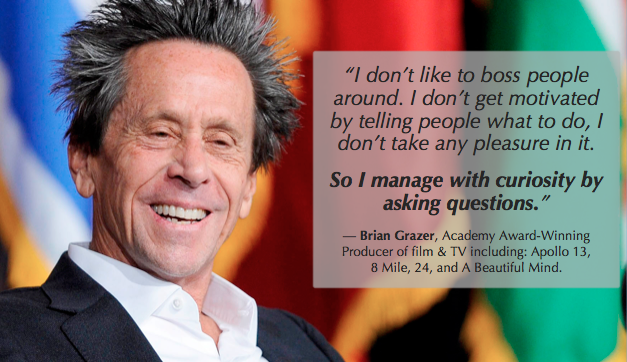
11) Ask 1 more question.
"When the supervisor thinks the subordinate has said all he wants to about a subject, he should ask another question. He should try to keep the flow of thoughts coming by prompting the subordinate with queries until both feel satisfied they have gotten to the bottom of the problem."
Curiosity is a mindset that every manager needs to develop. That's because asking the right questions can make all the difference.
It's a key part of what helped Brian Grazer produce so many incredible films and shows including Apollo 13, 8 Mile, 24, and Arrested Development. And it's a key part of the Andy Grove leadership philosophy.
Asking the right question can help you:
- Learn about your team members so you can lead them better
- Build rapport and trust
- Reveal issues that they don't bring up on their own
- Gather feedback that can help you be a better manager to your entire team
- Uncover their goals and dreams so you can put them on a path toward professional development
- And a lot more.
The right question asked at the right time can mean the difference between success– uncovering an issue that's growing within the team early– and failure– never realizing there's an issue until a third of your team walks out the door.
Problems won't knock on your door, you have to go in search of them. You do that by asking good questions, especially during one-on-ones where your people are more willing to open up.
Questions are especially good for digging around without having to make assumptions or rushing to judgment.
You can ask what someone thinks about how the team is functioning if you sense an issue between team members or about their goals. Meanwhile, if you want to know more about their motivations, let them speak, and listen intently.
By asking good questions, what you learn becomes invaluable as it helps you lead everyone better moving forward.
Further reading: We have a big collection of questions you can ask as a manager for every situation. Try these in your 1 on 1s:
- One on One Meeting Questions Great Managers Ask Their Teams
- 18 Questions to Ask Your Manager to Improve Your Relationship and Better Manage Up
- 31 Questions to Ask Remote Employees to Better Support Them
- 6 Questions You Must Ask When You Start Managing a New Team
- 66 Questions to Ask in Your Skip Level 1 on 1 Meetings
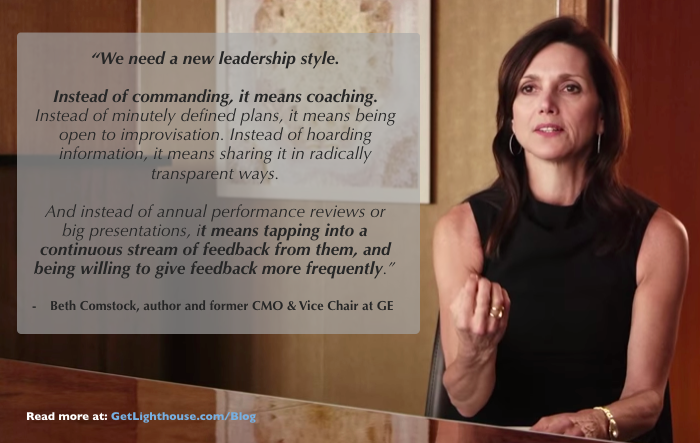
12) Guide your people with regular coaching.
"The responsibility for teaching the subordinate must be assumed by his supervisor, and not paid for by the customers of his organization, internal or external."
Asking a team member to do something they haven't done before can be a great learning experience for them and valuable for the team as a whole. Just make sure you're not making your customers pay for their tuition in the process.
As Andy Grove writes, allowing your people to make their own mistakes unguided can have unwanted repercussions:
"‘He has to make his own mistakes. That's how he learns!'
The problem with this is that the subordinate's tuition is paid by his customers. And that is absolutely wrong.
The responsibility for teaching the subordinate must be assumed by his supervisor, and not paid for by the customers of his organization, internal or external."
Instead of throwing your people into a new task and letting them learn solely from experience, gauge where each person is at and coach them based on their task-relevant maturity.
As their skills develop, continue to guide them with regular coaching during your one-on-ones. Identify the right areas to work on with each person and the right feedback to give them to help them move forward.
Want to complement your coaching with amazing feedback? Then learn how to use the Prepare-Listen-Act model for giving feedback in this episode of the Creating High Performing Teams podcast.
Further reading: If you want to learn more about why managers need to become coaches and how to become a great coach to your team, read Why Today's Managers must Become Coaches (and how you can do it) or how you can get even better as a coach.
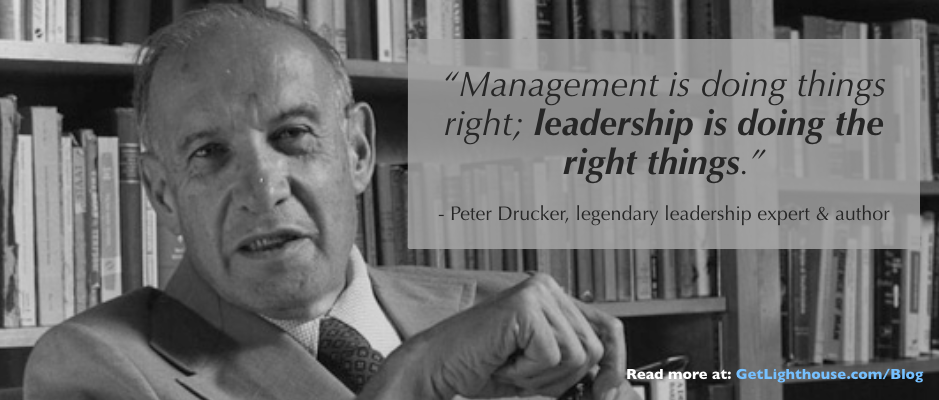
13) Find your highest leverage opportunities.
“A manager must keep many balls in the air at the same time and shift his energy and attention to activities that will most increase the output of his organization. In other words, he should move to the point where his leverage will be the greatest.”
If you're a manager with a lot on your plate (especially a new one), you're probably undervaluing your time. Do you find yourself swamped with things like these:
- Performing administrative tasks or creating a lot of your own systems from scratch
- Managing and maintaining Excel, Google Docs, project management tools, etc
- Attending way too many meetings that get in the way of getting real work and valuable thinking done
If the answer is yes to any of those, you're likely not making the most of your time. There is so much you need to accomplish as a manager, yet there’s only so many hours in the day.
Pushing yourself, putting in more hours, doing emails in bed, and otherwise stretching yourself eventually backfires. You can’t see the big picture any more, and your fatigue eventually becomes burnout.
There is a better way.
Be a Multiplier for Your Team
Being a multiplier means that as a manager, the highest value thing you can do is make your team more effective. Saving everyone on your team 1 hour is much more valuable than doing an hour of your own work. That’s why you should always be looking for ways to remove their biggest bottlenecks first, or outsource simple but time-consuming tasks they do.
By combining these strategies, you’ll be on your way to turning leverage into one of your most valuable weapons as a manager.
As Andy Grove put it, your biggest priority as a manager should be activities that will increase the output of your entire organization rather than just yourself. Understanding how to use leverage is the best strategy to improve your own and your team’s quantity and quality of work.
Further reading: Want more easily applicable tips to get the most value out of your time? Here are 5 more principles to help you master priority management.
You can also listen to Eric Jorgenson, a guest on our podcast who built a whole course on using leverage to unleash your team to focus on the highest value things they can do.
Bonus High Output Management Lesson: Management is not 1-size, fits-all:
"Don't confuse people's Task-Relevant Maturity with their general competence."
Just because someone was great at one task does not mean they're well-prepared for another. As a manager, you must recognize that you need to adapt to the skills, personalities, and needs of your team. You cannot manage in a 1-size, fits-all approach.
We've hinted at this concept a few times already in this post, and now we want to dive deeper.
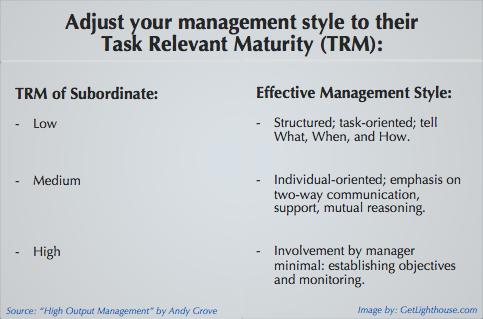
When it comes to skill sets, Andy Grove recommends handling management through his concept of Task Relevant Maturity:
- When someone's skills for a task are LOW, give structured, task-oriented instructions. Tell them when, what, and how.
- When someone's skills for a task are MEDIUM, give emphasis to 2-way communication, support, mutual reasoning. Focus on the individual and any needs they have.
- When someone's skills for a task are HIGH, be hands-off. Establish objectives and monitor as needed.
You can learn more about Task Relevant Maturity with your team here, and for your own Task Relevant Maturity, read our post here.
Management is a series of never-ending challenges. Being able to adapt, empathize, and listen well are critical skills. Grove covers a lot of ground in High Output Management and these are just a few of the awesome quotes from the book.
I highly recommend you pick up your own copy of High Output Management.
Want to build up your management skills? Lighthouse Lessons can help you.
Our bite size, highly actionable programs are perfect for even the busiest of managers. Become a better leader like Jonathan Silva did by learning more and signing up here.
